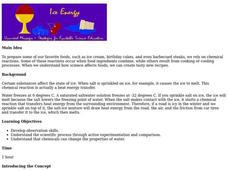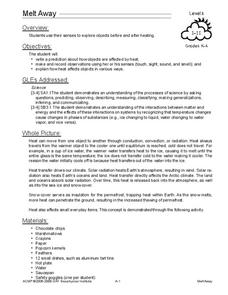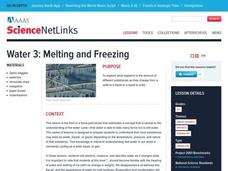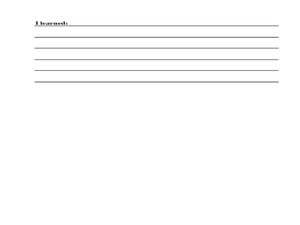Curated OER
Solar Matters II- Ice Cube Race
Young scholars discuss the methods of energy transfer. In this energy transfer lesson plan, students use ice to demonstrate what happens when energy is transferred. Young scholars complete a Science Journal page as an assessment.
Curated OER
Ice Cream Lab
This very thorough lesson plan has learners collect all ingredients necessary and work in pairs to make ice cream using plastic bags. They take temperature readings and record them on the chart as well as record findings on the...
Curated OER
Observing Reactions
Young scholars use the scientific method to complete to experiments that have visible reactions. In this visible reaction lesson, students participate in an experiment with melting ice and one with inflating a balloon. Young scholars...
K5 Learning
Changes
You can't unring a bell, but can you unmelt an ice cube? Readers consider reversible and irreversible changes with a short informational reading passage and accompanying comprehension questions.
Consortium for Ocean Science Exploration and Engagement (COSEE)
Plankton to Penguins: Antarctic Food Web
A well-written lesson plan, second in a series of four, gets high schoolers exploring how the Antarctic food web is impacted by climate change and the associated melting of polar ice sheets. It begins with a PowerPoint presentation about...
PHET
Energy Forms and Changes
Is the ice cooling down the water or is the water melting the ice? Here is a simulation that explores thermal energy transfer with iron, brick, and water. It demonstrates the flow of energy and what happens when each material is either...
Curated OER
Global Meltdown
In this environmental science lesson, students study data and animation on global temperature increase to complete 8 short answer questions that follow.
Polar Trec
Foraging for Fish in a Melting Arctic
How much do you know about the black guillemot of the Arctic region? With great background information, images, and a quick discussion, the class will learn all about the plight of the foraging seabird as they play a fun game. First,...
Curated OER
The Frigid Gourmet
Students make a " science surprise" or ice cream in the lab. In this melting point depression lesson plan, students use various substances with ice to determine the effects on the melting point of ice and the ability to make ice cream....
Curated OER
Ice Energy
Students investigate how salt affects the state of ice. In this ice cream making lesson, students change the freezing temperature by adding salt and observing the results. Students use experimentation and comparison to see how chemicals...
Curated OER
Water and Ice
Students perform experiments in pairs to visualize the changes in water during freezing and melting. In this properties of water lesson plan, students use their senses and inquiry tools to understand the changes in state of water....
Curated OER
Melt Away
Students explore objects before and after heating using their senses. In this matter and energy lesson, students experiment with a variety of objects and use their senses (except taste) to make predictions and record observations...
Curated OER
Melting and Freezing
Students explore how various substances change from a solid to a liquid or from a liquid to a solid and how temperature, pressure and nature play an important role in this process. In this melting and freezing lesson,...
Curated OER
Baking Ice Cream
Students discover the concept of an insulator. In this science experiment lesson, students follow the directions for baking ice cream. When baking is completed, students observe the results and answer questions on the provided worksheet.
Curated OER
Water Cycle Stories
Students explore the water cycle and associated phase changes. They predict what happens to the mass of an ice cube in a Ziploc bag, discuss and act out phase changes and diagram the water cycle.
Curated OER
Ice Cream Blizzards
Fourth graders explore whether the making of homemade ice cream is a physical change or a chemical change in a lab experiment. Students identify states of matter, describe the physical properties of states, and collect temperature data...
Curated OER
The Day After Tomorrow: How is the Density of Water Related to Climate Change and Global Warming?
Science learners simulate what happens when ice breaks up and floats on water and how increased pressure on ice causes it to melt faster. They view a clip from the movie, The Day After Tomorrow, and relate their lab activities to what...
Curated OER
Ice Energy
Students explore how chemicals change water. In this chemical change lesson, students participate in an experiment to observe how salt effects ice and how ice cream freezes.
Curated OER
Observing Sea Ice
Students study and observe types of sea ice found in Alaska. In this sea ice lesson, students use the student network for observing weather to study the different types of sea ice. Students study sea ice depicted in Alaskan art.
Curated OER
Changing States of Matter - Making Ice Cream
Students make ice cream as a result of viewing changes of states of matter. In this matter lesson plan, students learn how heating and cooling can effect a state of matter to change.
Curated OER
The Ice Age
Students study the ice age and the causes of it. In this Ice Age instructional activity students examine why those animals became extinct and complete activity sheets.
Curated OER
Water and Ice
Learners observe what happens to water as it goes from a solid to a liquid. For this exploratory lesson students gain an understanding for the water cycle while working in groups observing what happens to water as it changes...
Curated OER
Cut Ice Cubes in Half Like Magic
Students explore the process of melting or cutting ice. In this scientific observation lesson, students discover that the pressure from two weights will pull a string through an ice cube by melting the ice directly under the line of...
Polar Trec
Nature's Density Column
Nature provides density columns in the polar regions that provides food for many animals. Young scientists build their own density columns with water in order to answer analysis questions. Through a slideshow presentation, scholars...























